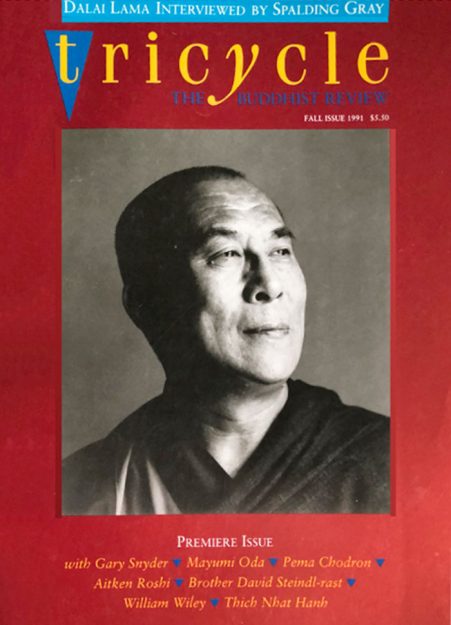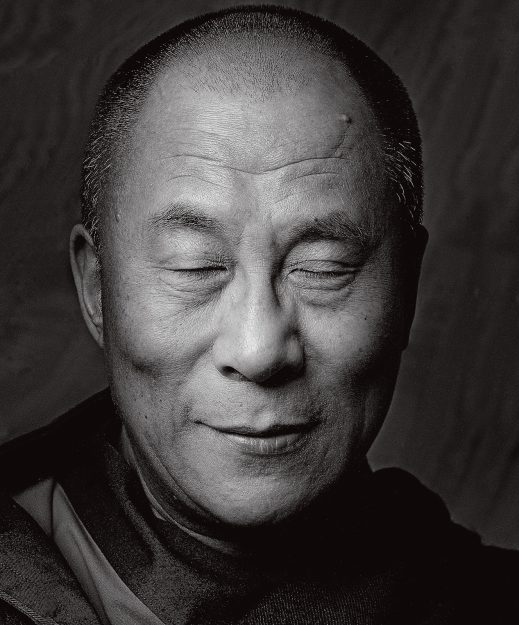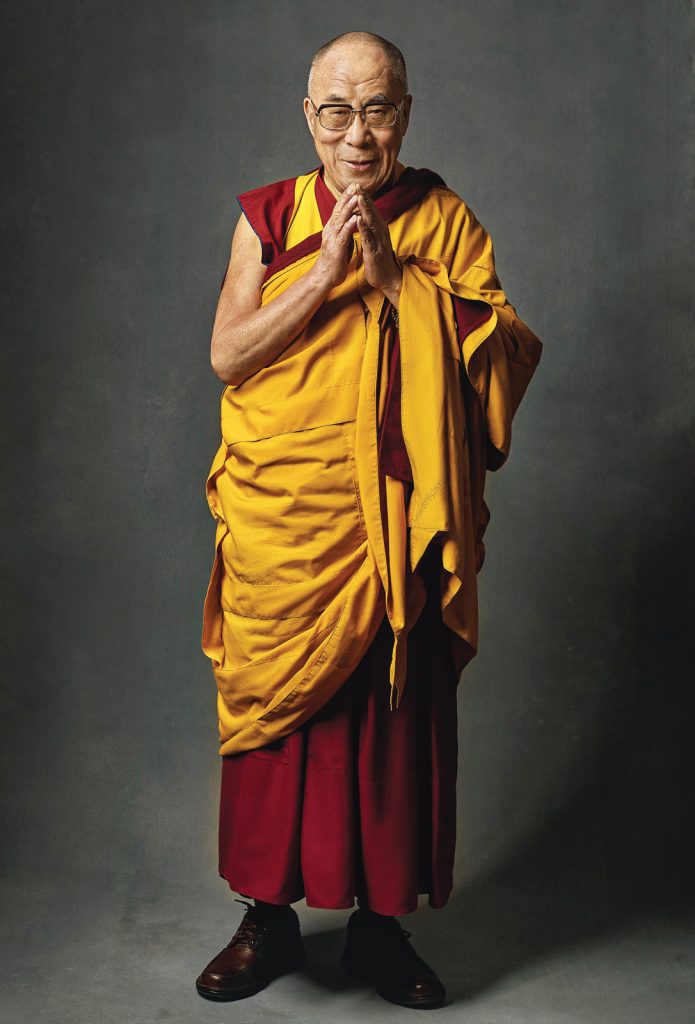Thirty years ago, the cover subject of Tricycle’s premiere issue was Tenzin Gyatso, the 14th Dalai Lama, photographed by Herb Ritts (1952-2002). His Holiness had won the Nobel Prize in 1989 and was touring the world in 1991 to launch the Year of Tibet, aimed at garnering international support for nonviolent efforts to counter Chinese occupation. But when he was interviewed for Tricycle by the writer and performer Spalding Gray, their conversation was not political but surprisingly intimate, ranging over meditation practice, dreams, fear, and quotidian life.

Today, the Dalai Lama is one of the most famous and revered spiritual leaders on the planet. And his conversation with best-selling author and longtime Buddhist practitioner Daniel Goleman reflects quite a different set of interests, notably how Buddhism can contribute to Western neuroscience, psychology, and education.
You often talk about how ancient Indian thought could add to modern education. What do you see as missing? Modern education is very much oriented around external things, material things. So in the West there’s not much concept of training our mind. But in the Indian tradition, the Buddha himself said, “My followers should not accept my teachings out of faith, but rather through investigation.”
All ignorance is based on appearances. In order to reduce ignorance, we must investigate deeper reality—tongpa nyi [Tib., “emptiness”; Skt., shunyata]. The Buddha’s teachings deal with reality. So it’s not just faith—we must utilize our intelligence. Faith and intelligence must combine. In an Arab Muslim country and a European Christian country you mainly see faith in God, whereas in India you are your own master. Ultimately, everything depends on yourself. Buddha cannot save you, cannot protect you, unless you train your own mind. The Buddha made clear the way to do that.
India had almost three thousand years of nonviolence, ahimsa, based on karuna, compassion. India also developed shamatha—“single-pointed mind”—and vipashyana, “investigation.” Then the Buddha came. He taught dharma according to the different mentalities of different people, so that buddha-dharma became very rich, a knowledge institution. The emphasis was on reasoning rather than faith.
Explaining the mind through the brain is not sufficient. Mind is on a different level. The Indian tradition, particularly the knowledge tradition, [offers] a lot of explanation about the mind and destructive emotions. So now a number of scientists are paying attention to Buddhist philosophy and Buddhist psychology. I hope we will take modern science and ancient Indian psychology and combine the two. I think we can serve humanity more effectively and more usefully that way. And we can do it without religion. This is just knowledge about psychology, about emotions. It’s simply how to create peace of mind and a happy life, and ultimately, how to create a peaceful world, a happy world. India’s tradition is secular. We can teach the secular way in schools.
What’s also basic is the altruistic mind, the oneness concept. All eight billion human beings that live on this planet have the same emotions, the same mind. We all have the seed of compassion. Physically, mentally, emotionally, we have the same potential.
About compassion: I’ve heard you appreciate Christians for good works like building clinics and schools. I’ve also heard you say that Buddhists could be doing more to put compassion into action. What do you have in mind? Buddhist literature [has] a lot of explanation about emotions and the mind, and how to tackle anger and fear. That part is quite rich in ancient Indian tradition. From the Christian point of view, we are all created by one God and God is infinite love. We are all children of that kind of father. If you seriously think that, then we should all live harmoniously and compassionately, according to God’s wish.
What about Buddhists? Buddhism is a nontheistic religion. Everything ultimately depends on one’s own action. If you help others, if you serve others, you benefit. So altruism is a source of happiness. And a source of unhappiness is all the disasters due to anger. Anger comes from fear; fear comes from a self-centered attitude.
“When we face some serious problem, then our usual sort of thinking—‘I,’ ‘I’—lessens. Sometimes some difficulty is a way to develop altruism.”
With the pandemic, people became kinder and helped each other more in a spirit of interconnection. How can this time be an opportunity for us to become better people and create a better world? I think we can learn from the nurses and doctors. They are really serving, helping these helpless people, regardless of their own safety. They truly practice altruism by serving other people.
Do you think that their example, or our own experiences, will leave people kinder after the pandemic is over? To some extent, yes. When we face some serious problem, then our usual sort of thinking—“I,” “I”—lessens. For example, if there is a flood or an earthquake, people don’t care what others’ religion is, what others’ race is. They come together and work together. Sometimes some disaster, some difficulty, is a way to develop altruism.
That sense of oneness, sense of helping other people, do you think it lasts? In education, we should emphasize the importance of the oneness of all human beings. We are brothers and sisters, and we should help each other. If we feel that not only on a physical level but also on a mental level, we’re much happier. When you feel “I,” only “I,” then you feel lonely. So altruism is the best way to fulfill your own interest.
There’s another crisis now—global climate change. I’ve heard you say that at some point the rivers in Tibet will be dry, like the rivers in Afghanistan are becoming today. And that, of course, would be a catastrophe for all the people throughout Asia who depend on water from Tibet. How long will it be until that happens? One Chinese expert told me that in the next few decades, there is a real danger that all the water on this planet will dry up. So for the next few decades, it is our responsibility to take special care about ecology. I think the human mind is not thinking long term. We just follow the last few centuries in our way of life and habits. Global warming is a reality. Accordingly, we should pay more attention. Tibet is the ultimate source of water for all the major rivers in India, China, and Vietnam. So we must pay more attention to the ecology of Tibet. We must think about the next two to three generations at least.
If you see the next two or three generations as being able to slow down global warming or reverse it, does that mean that the prediction of rivers drying up would be far in the future? Global warming, nobody can stop that. But we can postpone.

You’ve been very active in the encounter between Buddhism and contemporary culture, particularly science. What are some of the major things each side has learned from the other? Buddhists use reason and analytical mind in meditation. Science is seeking reality. Both analyze reality, but we have differences. Scientists utilize a lot of different machines. The Buddhist tradition, the knowledge tradition, uses only the brain.
Now many scientists are paying more attention to a subtle level of explanation about reality and particularly about the mind. So modern science, [which was mainly] about material [things], now pays more attention to our brain. Then that automatically brings attention to the mind and the emotions.
Looking at it from the science side—I’m a psychologist by training—it seems that Buddhism has a more subtle understanding of the mind. In fact, it talks about subtle levels of mind that Western psychology doesn’t know anything about. Does it seem to you that something is missing in Western psychology? To some extent, yes. Science from the West is mainly oriented around external things. Ancient Indian tradition, including Buddhism, [has] more explanations about mind—for example, why in a waking state we use one level of mind and emotion, and then the dream state is a deeper level of mind and emotion. You can train during dreaming [to reach] a more subtle level of mind and emotion. Then [at the] subtlest level, [there is] no longer emotion but still, pure mind. So a deeper experience of the subtle mind affects the grosser level of mind.
You’re helping Richard Davidson [University of Wisconsin–Madison psychology professor and founder of the Center for Healthy Minds] do research on thukdam, a rare deep meditative state after physical death. This practice seems to depend on a more subtle level of mind. Could you explain why this project is important? Here, in Dharamsala, there have been a number of such cases after death. For example, my own teacher, Ling Rinpoche, remained in thukdam for 13 days. And one scholar, a practitioner in South India, remained in thukdam for almost three weeks. So now some scientists—one is a Russian professor at Moscow State University—are seriously paying attention. Richie Davidson noticed that when a brain monitor is connected to a person in thukdam there is some sort of unusual [activity]. This shows clearly a different level of mind—when the brain is no longer working, but still the subtle mind is there.
Some years ago, you requested a Mind and Life institute meeting on destructive emotions. Given the different levels of consciousness you’re describing, are there differences in when an emotion becomes destructive? The destructive emotions are mainly related to the grosser level of mind. Subtler mind also uses the subtle level of some emotions. But the grosser level of emotion is no longer there.
Anger or fear, jealousy—these destructive emotions are based on too much self-centeredness. Altruism is thinking about the well-being of all sentient beings, and sometimes in thinking about them tears come. So some emotions are very positive and don’t disturb your mental state. As soon as I wake up, I think about altruism. One Shantideva prayer [says], “So long as space remains, I will remain in order to serve sentient beings.” This gives you inner strength, determination. With more inner strength, destructive emotions do not have much effect. At the subtler level, there is no longer any danger of destructive emotions arising.
One reason to meditate [is that a] deeper level of mind reduces the power of those emotions that are related to a grosser level of mind. On a subtle level, the body is like a dream body separate from your [ordinary] body while you meditate. That shows the effect of meditation. People who have disturbed their mind and do too much thinking should just meditate. That is good for mental rest.
One-pointed meditation, not thinking, is useful for strengthening the stability of the mind. Then, in vipashyana, analytical meditation, the mind will not follow [or be attracted by] sounds and seeing but will remain still. There are many different analytical meditations. As a Buddhist practitioner, I always use the analytical meditation about shunyata. Very useful.
Thank you for subscribing to Tricycle! As a nonprofit, we depend on readers like you to keep Buddhist teachings and practices widely available.
